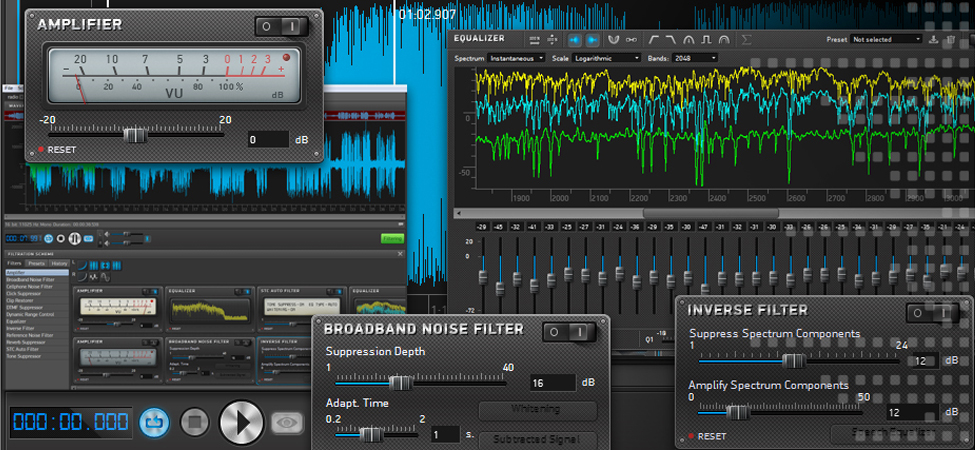Broadband Noise Filter
The broadband noise filter is designed to suppress background noise from the room or the street and interference from communication channels or recording equipment. These noises come across as hums, rumbling, hisses or roars. Other methods don’t remove these noises effectively because they’re spread across the entire spectrum, intersecting with the speech signal. The broadband noise filter algorithm automatically adapts to the changing noise floor, so it doesn’t need to be trained, offering a unique combination of efficiency and simplicity.
Inverse Filter
Inverse filtration effectively suppresses strong periodic noises from electrical pick-ups and mechanical vibrations, recovering the speech signal and equalizing its frequency response. It amplifies weaker signal components while suppressing stronger ones. The average spectrum therefore tends to approach the flat spectrum, unmasking the speech signal and improving its intelligibility.
Tone Suppressor
The tone suppressor filter is most effective for narrow-band stationary and harmonic interferences, including power supply hum, slow melodic music and sirens and drones of all kinds. Instead of erasing the noise frequencies from the spectrum, the tone suppressor uses “smart” methods to detect and subtract them. The result is better speech quality than that provided by other filters.
Click Suppressor
The click suppressor restores audio fragments distorted by various pulse interferences, such as clicks, old vinyl crackles, radio noises and short pops. The algorithm automatically detects, suppresses and substitutes impulses with smoothened and weakened interpolated signals. Fragments without clicks stay intact.
Dynamic Range Control
With dynamic range control, you can amplify weak signals to balance the level of speech between two speakers or weaken them to suppress noise in pauses between loud speech fragments.
EQ
A 4096-band graphic EQ combined with a spectrum analyzer is used to do precise spectral corrections of distorted audio signals. The EQ is supplied with a wealth of options, including automatic filters, the ability to use and create presets, input and output spectra display and linking sliders for simultaneous control. The Sound Cleaner EQ is an indispensable tool for a wide scope of restoration and enhancement challenges.
Reverb Suppressor
Sound Cleaner II’s unique reverb suppression algorithms decrease reverberations to raise speech signal intelligibility and reduce listener fatigue. Reverberated signals are interpreted as resonant, indecipherable speech. The signals aren’t masked by additional noises, but become distorted themselves. This complicates the enhancement task and makes the reverb suppressor a valuable asset.
DTMF Suppressor
The DTMF filter targets phone dialing sounds. Despite their tonal nature, these noises can’t be effectively suppressed with tonal filters because of their short duration. That’s where the DTMF suppressor comes in handy.
Cellphone Noise Filter
Audio recording devices easily pick up interference from incoming cell phone calls. Sound Cleaner II’s new dedicated Cellphone Noise Filter attenuates these pick-ups.
Clip Restorer
When a signal’s amplitude exceeds the recording device’s dynamic range, the waveform is clipped and the sound appears distorted. The clip restorer algorithm detects and restores clipped fragments by reconstructing lost information.
STC Auto filter
Novice audio experts will enjoy auto filter. This single control is used to alleviate the most commonly encountered noises.
Reference Noise Canceler
The backbone of these methods is acquiring the information about the interference from the reference channel and using it to remove this interference from the primary channel. The reference noise might be presented as a TV, radio or music playing in the background. The new sync function allows receiving reference channel separately from the main channel. It might be recorded on apart from main channel or downloaded from the Internet. Ideal sync of reference and main channel is a must precondition for successful filtering. Now this operation is done automatically to provide users with the best results.
More Filtering Capabilities
Sound Cleaner II offers new filtering capabilities. Get rid of cellphone pick-ups and DTMF dialing beeps with the new Cellphone Noise Filter and the new DTMF Suppressor. Restore clipped audio with the new Clip Restorer. Novice audio experts will enjoy Auto Filter. This single control filter can be used to alleviate the most commonly encountered noises.
Easy Navigation
The functional waveform navigation bar lets you see the entire signal. The area being analyzed is displayed in the waveform navigation window. This can be easily changed by selecting another section for display.
Full control over processing history
Every action that modifies the signal is logged in the history tab and made available for undo/redo.
Professional activity reports
Sound Cleaner II generates professional reports featuring your company logo and contact information, audio file information, a log of filters applied and their settings, as well as all signal changes. Screenshot tools let you enhance your report with input and output waveforms and spectra.
Working with projects
Saving a file as a project lets you keep the filtering sequence, text transcripts and modificateion history for further use.
Create forensic transcripts
Sound Clearner II built-in text editor links text to audio for quick reference
Sound Cleaner II new audio sync algorithm revolutionizes reference noise filtering by recording a mono reference channel separately from main channel.
Widest range of audio formats supported
Sound Cleaner II extracts audio tracks from video files in virtually any format and codec.
Finally on Mac
Sound Cleaner II can be installed on PCs and Macs.
VST support
All Sound Cleaner II filters are available from any DAW as a VST plug-in.

